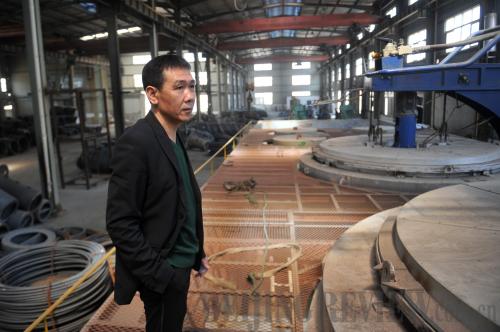|
 |
|
FUTURE PROSPECTS: Chen Chunlai, owner of a fastener processing factory in Wenzhou, Zhejiang Province, stands in his factory workshop, invested with private equity from a local private capital management firm (HUANG ZONGZHI) |
Relaxing lending rates
The People's Bank of China, the country's central bank, announced on July 20 it would remove the lower limit for lending rates, and financial institutions can independently decide lending rates in accordance with business principles.
Guo Tianyong, Director of the Center for Chinese Banking Studies of the Central University of Finance and Economics, sees relaxing lending rate control as an important step for China to advance financial reform, demonstrating the top leadership's resolve in pushing forward financial reform.
In a bid to relax capital control and realize the convertibility of the yuan under the capital account, interest rate liberalization is considered a prerequisite for China. Yet the Chinese Government had been reluctant to relax interest rate control, due to concerns that Chinese banks may attract deposits with high interest rates and then squeeze bank profits.
According to an announcement on the central bank's website, relaxing lending rate control is necessary because all macro- and micro-conditions to advance interest rate liberalization have been mature. At the macro-level, Chinese economic performance is now steady and prices are stable, creating a good opportunity for the government to further advance the reform. At the micro-level, with steady progress in the financial reform in recent years, supervision of financial institutions has been strengthened, and they are now more capable of independent pricing. Companies and individuals are also more adaptable to the market-oriented pricing environment. After years of development, the Shanghai Interbank Offered Rate has become an important basis for pricing of corporate bonds, derivatives and financial services. Moreover, the government's monetary policies can be effectively implemented at the financial market.
Guo said that fully relaxing lending rate control will help the financial industry better support development of the real economy and then upgrade the Chinese economy.
Pilot FTZ
Another indication of the Chinese Government's intention to advance the reform process is the establishment of the Shanghai FTZ on September 29.
The Shanghai FTZ will explore a new path and model for China's opening up, accelerate transforming government functions and boost transformation of the economic growth model.
Looking back, China's reform and opening up in the previous three decades is known as "shallow-water reform," as it was without experience and was allowed to learn from mistakes.
China has now entered "deep-water reform," also with no experience to learn from, but this time no mistakes will be allowed. Therefore experimental projects must first be carried out in pilot programs before any systems are launched nationwide.
To comprehensively deepen reform, Long said the Chinese Government needs to balance the relationship between reform, development and stability.
Email us at: lanxinzhen@bjreview.com
Other Reform Measures in 2013
- Fiscal reform
As of August 1, an experiment of transferring business tax to value-added tax in the transportation industry and certain modern logistics industries are expanded to the whole country, and production, screening and distribution of TV plays and films are incorporated into the experiment. The government will also incorporate railway transportation and post and communication industries into the experiment at the appropriate time, and fully complete the business tax to value-added tax process by 2015.
The reform will solve the problem of double taxation, reduce the tax burden of enterprises in pilot industries, help accelerate development of the service industry and promote transformation and upgrading of enterprises. It will also be conducive to improving the industrial structure, advancing transformation of the economic growth model and improving the quality of economic growth.
- Railway freight reform
As of June 15, a reform began in the freight organizations of the country's railway industry. This is another important market-oriented reform in the railway transportation industry after the establishment of China Railway Corp. and the abolition of the Ministry of Railways.
In China's development of a market economy, railway transportation is one of the few industries remaining of the planned economy and one of the few remaining monopoly industries after China's accession to the WTO in 2001. The industry has been unable to meet the demand of Chinese economic development.
Reform of railway freight shows the resolution of the Chinese Government in breaking this monopoly. The newly established China Railway Corp. will help establish railway transportation management and operation mechanisms to meet the demand of a market economy, enhance the competitive advantages of the railway freight industry and transform the Chinese railway industry to a modern industry able to withstand market competition.
- Tax exemptions
As of August 1, small and micro-sized enterprises with monthly sales revenue no more than 20,000 yuan ($3,300) are exempted from value-added tax and business tax.
At present, there are 50 million small and micro-sized enterprises in China. The tax reduction will benefit more than 6 million of these, involving employment and incomes of tens of millions of people.
Small and micro-sized enterprises, most of which are in labor-intensive industries, create a huge number of job opportunities and serve as an important channel to improve livelihoods. However, for restriction of capital, technology and talent, small and micro-sized enterprises have poor modern management skills, and problems of financing difficulties and weak competitiveness are limiting their development.
Supporting small and micro-sized enterprises will help encourage business startups and enable them to better play their role in stabilizing economic growth and expanding employment.
(Compiled by Beijing Review) | 